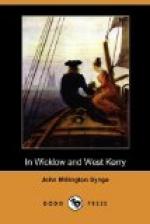When I had spoken to one or two men that I wished to see, I sat down near a bridge at the end of the green, between a tinker who was mending a can and a herd who was minding some sheep that had not been sold. The herd spoke to me with some pride of his skill in dipping sheep to keep them from the fly, and other matters connected with his work. ‘Let you not be talking,’ said the tinker, when he paused for a moment. ’You’ve been after sheep since you were that height’ (holding his hand a little over the ground), ’and yet you’re nowhere in the world beside the herds that do be reared beyond on the mountains. Those men are a wonder, for I’m told they can tell a lamb from their own ewes before it is marked; and that when they have five hundred sheep on the hills—five hundred is a big number—they don’t need to count them or reckon them at all, but they just walk here and there where they are, and if one is gone away they’ll miss it from the rest.’
Then a woman came up and spoke to the tinker, and they went down the road together into the village. ‘That man is a great villain,’ said the herd, when he was out of hearing. ’One time he and his woman went up to a priest in the hills and asked him would he wed them for half a sovereign, I think it was. The priest said it was a poor price, but he’d wed them surely if they’d make him a tin can along with it. “I will, faith,” said the tinker, “and I’ll come back when it’s done.” They went off then, and in three weeks they came back, and they asked the priest a second time would he wed them. “Have you the tin can?” said the priest. “We have not,” said the tinker; “we had it made at the fall of night, but the ass gave it a kick this morning the way it isn’t fit for you at all.” “Go on now,” says the priest. “It’s a pair of rogues and schemers you are, and I won’t wed you at all.” They went off then, and they were never married to this day.’
As I went up again through the village a great sale of old clothing was going on from booths at each side of the road, and further on boots were set out for sale on boards laid across the tops of barrels, a very usual counter. In another place old women were selling quantities of damaged fruit, kippered herrings, and an extraordinary collection of old ropes and iron. In front of a public-house a ballad-singer was singing a song in the middle of a crowd of people. As far as I could hear it, the words ran like this:
As we came down from Wicklow
With our bundle of switches
As we came down from Wicklow,
Oh! what did we see?
As we came to the city
We saw maidens pretty,
And we called out to ask them to buy our heath-broom.
Heath-broom, freestone, black turf, gather them up.
Oh! gradh machree, Mavourneen,
Won’t you buy our heath-broom?
When the season is over
Won’t we be in clover,
With the gold in our pockets
We got from heath-broom.
It’s home we will toddle,
And we’ll get a naggin,
And we’ll drink to the maidens that bought our
heath-broom.
Heath-broom, freestone, black turf, gather them up.
Oh! gradh machree, Mavourneen,
Won’t you buy our heath-broom?




